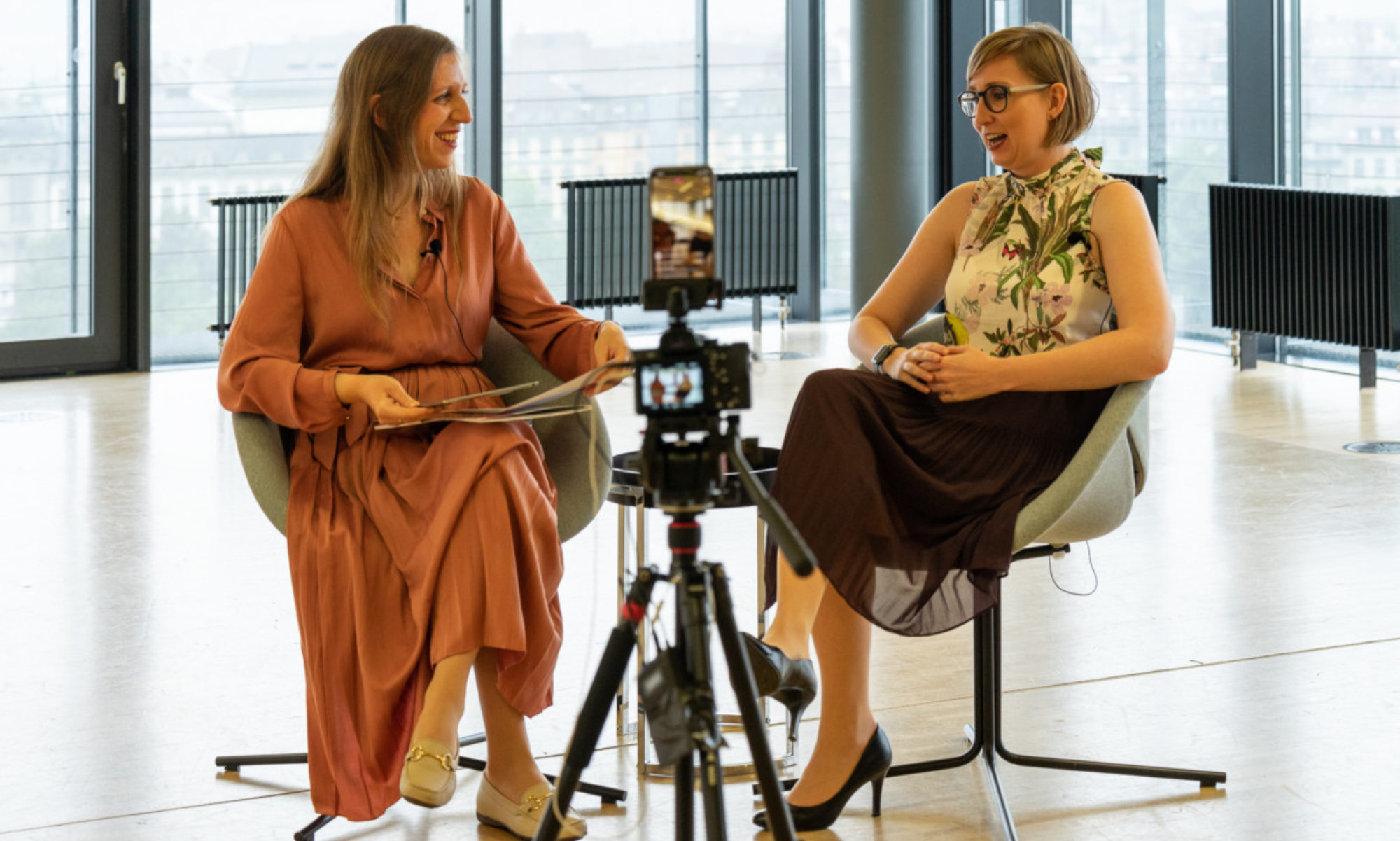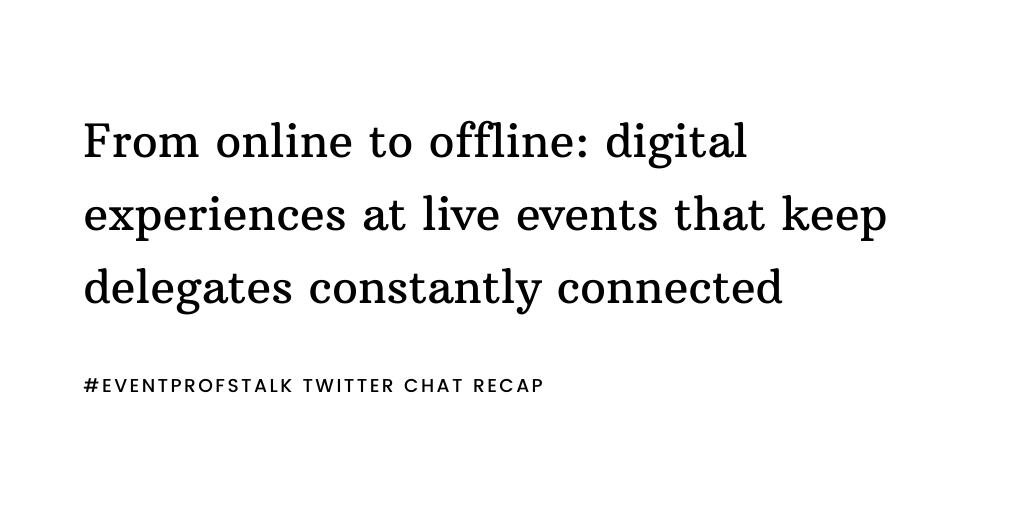In the events industry, we often talk about how to engage the online community with live events and vice versa. BUT, there is one thing that is often missing in this discussion—how to engage our audience online while they attend the live event. Perhaps controversial, because the focus of the live events is face-to-face interaction, but the fact is that social media and technology are not going anywhere, and it’s better to use it to engage and enhance the attendee experience at our events rather than leaving it to chance.
There are many digital experiences at live events that keep the delegates connected to their mobile devices, including registration, social media, hashtag usage, photo walls, online polling and apps. Which tools are the most effective? To explore this area further, we hosted a Twitter chat to ask our global event community about digital experiences at live events—‘From online to offline: Digital experiences at live events that keep delegates constantly connected’—and gained valuable knowledge on the subject! You can read about it in the following sections and add your views in the comments below.
#eventprofs often talk about moving from online to offline interaction at the events. But there are also online interactions at live events. What are these?
According to Valerie Wagner, blogger and podcaster at Hotel O Motion, these include ‘answers to posts, retweets and questions… but unfortunately most of the time, they are not answered by organisers.’
According to the Calgary TELUS Convention Centre, ‘These involve apps and the use of social media live from the event; for example, with event-specific hashtags and audience interaction tools, such as Twitter walls or live Instagram feeds, social-photobooths or online surveys.’
PCMA, a platform for business event strategists, shared that ‘We use social media to share views of our events that participants are posting about, but it isn’t just limited to that! Communications between our live streamers, on our app and in private groups (a la Facebook) help grow physical and digital connections.’
SF xLab, event technology specialist from the digital experience wing of Shelton Fleming, added that ‘My favourite is the under-used video tweet, “Here’s what’s going on live at our stand. Come see us at C130 and try to beat Carla’s score on this funky game we have. Top prize is a magnum of champagne”.’
Irina Graf, founder of The MICE Blog and Event Planners Talk, added that ‘Online interaction includes to a significant extent social media—and because attendees are constantly on their phones, there are opportunities to enhance their online event experience by providing interesting content worth sharing on social media and connecting with other participants and using a hashtag.’
How online interactions can support and add value to delegates attending live events: Is it necessary or just a distraction?
For Irina, it’s a must, ‘Organisers need to design the event so that delegates can have something valuable to share, connect and also be interesting for people who are following online. For delegates, it can serve as external memory to document all the highlights and store them for later, such as names of speakers and venues.’
Calgary TELUS Convention Centre commented that ‘Online interactions can add tons of value to the event experience if done right. They can be highly informative for attendees, keeping them updated on what’s happening and engaged in conversations. These factors provide opportunities for networking too.’
The Vancouver CVB shared their thoughts from a CVB perspective, ‘We engage with the delegates of our large citywide conventions to provide helpful destination information (rapid transit, local events on now, unmissable experiences, etc.), and we keep a keen eye on the event hashtag to make sure they are happy.’ Calgary TELUS Convention Centre added that they take a similar approach, ‘As a Convention Centre, we also use those online opportunities to provide value to our visitors: where to eat, what to do around the Centre, important updates such as weather, transit, etc.’
Ain Chiara Bensenouci, Events Manager at Penguin Connect, shared that ‘Online interaction is necessary before/after the event to prepare, connect with other delegates, navigate content and access key learnings from the day. However, on the day, live events should be about connecting with people face to face unless the event is around tech/online.’ But she also added that ‘If the event is based around information and learning, everyone should be allowed to participate somehow, and online tools will help with that!’
Valerie offered that ‘Online interaction is particularly important if participants are not allowed to enter into a country for economic or political reasons. An alternative, in that case, would be to follow the event online. Online interaction not only relates to the events industry today; in the digital age, “as well as” applies, not “either or”.’
Irina highlighted that ‘Knowledge shared at events is no longer exclusive to the event. People go to events to have an experience and share this experience with other like-minded people. Therefore, there should be opportunities to transfer the knowledge into the digital space and look for ways to engage both online and offline audience in the co-creation of content.’
Shaun Hinds, Chief Executive at Manchester Central – Convention and Event Complex, shared that online interaction ‘can actually add valuable engagement; dynamic sentiment tracking, quick polls, expanding the conversation through Twitter or similar delegate response solutions, curated content suggestions, meet-ups and timed exhibitor activities can all form parts of such engagement.’ Irina added that ‘Online engagement from an event will generate interest and can attract new delegates for the next event.’
SF xLab commented that ‘Live streaming an event is actually fairly accessible and can be low cost. Combine that with Twitter, and you have people outside of the room adding to the conversation with references and articles about what the speaker is saying live. And take polls from everyone. Aside from that, more value comes out of being “present” at the event instead of with your head in a phone. About six years ago, I live-streamed a small conference using YouTube live/google hangouts, a laptop, an iPad, a cheap Zoom camera and a selection of very long cables. The hashtag was number 1 in London for hours and briefly number 3 in the world before being kicked off by #HarryStyles.’
Valerie added that ‘Online communication can be professionally accompanied by people who are at the event just for that. It must be co-organized and have a concept for the live event coverage.’
Robert Densmore commented, ‘If you have 1000 attendees at the event—you can have 1000 versions of your event…it’s like at a concert where the band play their big hit—1000 people singing their version of the same song…magic.’
PCMA concluded, ‘More people are embracing the idea that social media in business events isn’t just about being online—it’s about forming connections that bridge the gap between digital and physical communications. These are essential, but you also need a balance.’
There is a growing trend towards ‘digital detox’. Would you go to an event that forbids the use of mobile devices (partly or entirely)?
Calgary TELUS Convention Centre suggested that ‘Everything in moderation is fine. We love the wellness spaces many events have implemented with the goal of making people feel present, relax and enjoy themselves. Those moments to “recharge” are important too.’
Megan Strahle—Tourism, Hospitality & Events Master’s Student at the University of Queensland—commented that ‘It depends on the type of event! If the purpose is wellness or networking, yes. But for a conference/expo, no.’ Valerie also noted that how the event is communicated is important, ‘If it was clearly communicated from the beginning, I can make a decision; otherwise, no. Digital Detox is also a buzzword (and marketing).’
Victoria Matey—an event consultant specialising in event psychology—commented that ‘Although there are studies showing that the mere presence (!) of smartphones influences our productivity and diminishes attention, I’d say that there should be a balance between strict limiting and the extensive usage of devices. Balancing these options will improve engagement.’
For Irina, it’s no, ‘Using social media while at an event increases my interaction with the event and other delegates and helps me store/access key information throughout the day and also post event; it makes me more effective and productive.’
Ain added that ‘It would have to be very clear what the purpose of removing mobile phones is (i.e. help with creativity, connection, focus). Instead of digital detox, we should learn to interact with tech and social media in a healthy way because they aren’t going anywhere.’
Jasmine Smith, event entrepreneur and creator, shared that she would go to such event, but also that she has adopted unplugging regularly in her personal life, ‘Being offline requires me to pay attention and write things down; research has demonstrated that this a much better way to process information.’
For SF xLab, it is also a no, ‘Removing mobile devices would increase the use of printed material, which is bad for sustainability. I use my phone to take photos of many of the things I want to remember or show. My phone lives on silent and do no disturb, but is counterproductive for an event to enforce (if they could!).’
Shaun observed that ‘We see an increasing number of wellness installations/sessions in our events that is associated with less device dependence. That said, your digital companion can enrich an event experience, and so the “digital detox” idea won’t work for all.’
Events are about bringing people together to interact with each other, to make connections. Is it really necessary to have online experiences at live events?
According to Valerie, ‘It’s necessary in order to transport the event to the outside world, to expand the target group in any case! It is not for nothing that “Talk about the camp” applies to bar camps (an event format): How else can others be made aware of it and be there next time? With newspaper ads? Probably not!’
Irina thinks that ‘Because events are big gatherings, it’s not possible to see and meet everyone; therefore, technology can help delegates to navigate through the event and design their own programme, relying on their online interactions with the event and other delegates.’
Megan also thinks that the answer is yes, ‘Some people can be quite shy! Having the opportunity to interact online can give them the courage to go up to someone and ask to further the discussion. Online experiences (such as group chats) are also necessary for hearing-impaired inclusivity.’
SF xLab stated that ‘If >50% of people are in the room then no—there are more meaningful ways of making connections in the physical space. If there’s a large potential audience outside the room, you can add value to/get value from them, sure. You can’t get the same quality of experience through a screen.’
Robert also responded yes, ‘The live experience is the energy point—the digital can add value, context, democratise and increase interaction—inside and outside the event.. and it’s all recorded.’
PCMA shared that ‘When professionals are unable to attend, online experiences are a window into what the event offers, and can assist those who need some of those resources without being on the show floor.’
Shaun also agreed that the answer should be yes, and explained that ‘It reflects how we live, communicate, work, play. It’s integral. The clever bit is keeping it relevant and complementary. There are plenty of gimmicks, but good online engagement delivers a mass customisation solution tailored to the individual delegate.’
Live blogging vs extending event life cycle: What’s the difference?
Calgary TELUS Convention Centre suggested that both are important, ‘Live “blogging” is important because it provides opportunities to connect with other attendees, but it also creates content that can resonate with your audiences and provide value to them as well. And if the content is good, amplify it and extend the reach. Keep the conversation going!’
Valerie added that ‘Live blogs can extend the event, but only if the content from the live blog is merged into new content with all content created before, during and after the event. This content can also be used for the next event if it is prepared differently. For example, audio interviews with participants, impressions (e.g. pictures, video) and testimonials.’
Valerie added, ‘The question is: How valuable is content? If I look around me, once content is created, it expires as soon as it is published. But texts can be used again and again, in a different form: podcasts, videos, infographics, new text.’ Geraldine Huybrechts—social media and branding specialist and event planner—agreed and added, ‘That’s a shame because indeed, (pieces of) content can be recycled/reused.’
Irina explained that ‘Blogging happens only at the event, and extending event lifecycle is an ongoing process that takes the delegates on a journey and also encourages interaction and co-creation before and after the event.’
Robert explained that live blogging is short form, and extending event life cycle is long form. Live blogging involves adding value and democratising the content to an external audience—the post-event cycle should be longer form, reflective and more nuanced…with its value in the long form…’
SF xLabs defined extending event lifecycle as ‘carrying on an event community in a digital space post event. It’s something delegates (particularly to technical conferences) are crying out for, but they take cost and commitment to moderate for a full year (or more!) until the next event.’
From your personal experience, what are your top three online experiences at live events that you engage with?
Geraldine recommended ‘Live Twitter Wall, #hashtags and photo booths to share your picture with the logo of the company online. In general, online communication is (still) not particularly well integrated into live events.’ Irina also highlighted social media and hashtags, as well as live polls such as Slido to increase audience engagement.’
Valerie shared that ‘If an event is really accompanied online, then the online participants should also be included; that means answers, questions, linking, sharing. And in the best case, pass on the questions live on the site. I follow hashtags of events where I cannot be present. None of them have inspired me so far because unfortunately, the questions or answers of online participants are answered far too rarely.’
SF xLabs shared that ‘For me, attending events is about the here and now, but I do appreciate when talks I couldn’t get to are uploaded to YouTube post event, podcasts are made, and general round-ups.’
PCMA concluded and highlighted the three online experiences: 1. Hashtags, 2. Keynote quotes and 3. Livestreams! We’ve also found that bringing social media into a physical space (e.g. a digital post wall, or an Instagram Mosaic such as @ThisIsLuster), builds up interaction and excitement both online and in person.



This recap is a goldmine, thank you very much for this! As a conference interpreter, I am involved in all sorts of conferences including the ones banning the use of smartphones or other devices. I use social media a lot to share and discuss business issues but I tend to observe from my interpreting booth that people travel thousands of miles to attend large conferences and then spend the whole time on their smartphone screens. Even the interperting headphones add a strain on the comprehension, plus the notifications you get all the time… what do you take away from the meeting? Wonder what’s your take on this ?
pg slotมากมาย เล่นง่ายจ่ายจริง แตกจริง ต้อง pg slot เท่านั้น! เล่นสล็อต พีจีสล็อต เว็บไซต์ตรงผู้ให้บริการเกมสล็อตออนไลน์ชั้นหนึ่ง ทกลอง เล่น ฟรี พร้อมโบนัส
Curious about how A.I. can supercharge your business?
Take Your Quiz Now!” https://bit.ly/4c8cnmJ
keen virtually how A.I. can supercharge your business?
Take our quiz and uncover personalized insights on leveraging A.I. for success. From automating tasks to enhancing customer experiences, see how A.I. can make a difference!
https://bit.ly/4c8cnmJ